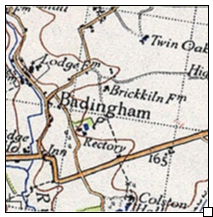-
Chair
Office : 07984 033345Email : thomasmountainbpc@gmail.com
Sub-committees & Responsibilities
-
Member
Office : 01728 638303Mobile : 07841 738824Email : robwelhambpc@gmail.com
Sub-committees & Responsibilities
None -
Member
Mobile : 07946 565 371Email : andrewlindesaybpc@gmail.com
Sub-committees & Responsibilities
-
-
Member
Office : 07495 122404Email : lisasweeneybpc@gmail.com
Sub-committees & Responsibilities
Councillors
Badingham Parish Council can elect or co-opt up to 9 Councillors. Council appointed a new Chair and Vice-Chair at the Annual General Meeting held on 26 May. Councillors may also be appointed to represent the Council in outside organisations.
Councillors are responsible for making decisions regarding a variety of items as itemised on the home page. The role is unpaid but can be very rewarding.
There are now 5 vacancies on the Parish Council post May 2023 elections. This does not bode well for Badingham to be able to act as an effective Parish Council - we need input from people from all walks of life to contribute to decisions the PC has to make, in order to come to the best solution for Badingham.
Why get involved? Do you want to do something positive and hope to make a difference by influencing decisions that affect your community? Please put yourself forward to become a Parish Councillor. Please send your details to the clerk with a brief paragraph about what you will bring to the role.
At least 1 of the following criteria must be fulfilled. You must:
- Be on the electoral register
- Own a property or land for last 12 months in the parish
- Work in the parish in the last 12 months
- Have lived in the parish or within 4.8 kilometres for the last 12 months
You must also be at least 18 years of age on the day you are nominated, and either a British citizen, a qualifying citizen of a Commonwealth country, a citizen of the Irish Republic, or a citizen of another member state of the European Union. We are moving to bimonthly evening meetings from Autumn 2022.
Please contact the parish clerk by email on badinghamclerk@gmail.com or T: 01986 798765 or speak to a Parish Councillor for more information.
The Role of a Parish Councillor
To appreciate what is involved in being a Parish (or Town) Councillor you need to know what a Parish Council is, and what it can and cannot do. We also have to get the image of the Vicar of Dibley out of our mind. So curiously, starting with the negative, the Parish Council is nothing to do with the Church or the Diocese; nor is it a voluntary and community sector body. “Your Parish Council is the local authority closest to the Electorate.”
Each councillor has their own reasons for running but the role offers the chance to make a huge difference to the quality of life for people in your local area. Being an effective councillor requires both commitment and hard work. Councillors have to balance the needs and interests of residents and the council.
To find out more about being a Councillor please look at the following document: Be A Councillor.
A Parish Council is a separate legal, corporate entity. First created by the Local Government Act of 1894 in most rural areas, the current consolidated legislation is that of 1972.
A Parish Council also provides services for the local people. These will range from recreation grounds and play areas, a cemetery and may be crematorium to allotments, bath-houses and nature reserves. What you provide is down to your Council. There is a list of the activities that a Parish Council has the power to provide. Like any statutory body it can only do the things for which the law or any governing document gives a power.
The Parish Council has one particular asset that is extremely valuable — it has the ability to set a Precept (sum of money), which is collected from all residents through the Council Tax system. With the right to levy a form of taxation come some duties. In particular a duty to behave in an ethical manner according to a Code of Conduct (declaring interests and leaving the room when likely to be prejudiced) and a duty to have the annual accounts subjected to audit.
“Training is available and support will be found from colleagues, the Clerk to the Council, as well as from the Suffolk Association of Local Councils, a body affiliated to the National Association of Local Councils”
All Councillors retire after a four year term, but casual vacancies may well arise in the intervening period. It is a useful way of seeing if you like being a local Councillor to take a seat for a short period before the next full elections
So if you want to do more for your community, if you want to spend your time productively, and if you can think, listen and act locally — Become a Parish Councillor.
For further details please click on the link below:
Register of Interests:
All Councillors have registered their pecuniary and non-pecuniary interests with East Suffolk Council and these are published on East Suffolk Council's website. To view a copy of the Councillors' Register of Interests please use the link below to be redirected to the relevant pages.
